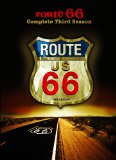| Reviews & Columns |
|
Reviews DVD TV on DVD Blu-ray 4K UHD International DVDs In Theaters Reviews by Studio Video Games Features Collector Series DVDs Easter Egg Database Interviews DVD Talk Radio Feature Articles Columns Anime Talk DVD Savant Horror DVDs The M.O.D. Squad Art House HD Talk Silent DVD
|
DVD Talk Forum |
|
|
| Resources |
|
DVD Price Search Customer Service #'s RCE Info Links |
|
Columns
|
|
|
Route 66: The Complete Third Season
Author's Note: Since this complete season disc collection is comprised of Roxbury Entertainment and Infinity's previous split-season releases for Route 66's third season - right down to the same numbered discs - I've ported over my two extensive reviews for those releases, and combined them for this one.
"After all, what's left to us but our separateness? And the dignity to bear it?"
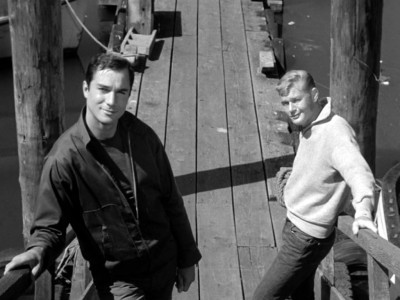
A triumphant return to form; perhaps the best season of this classic series...even with the abrupt, unexplained departure of co-star George Maharis, and the awkward arrival of his replacement, Glenn Corbett. Roxbury Entertainment and Infinity have released Route 66: The Complete Third Season, an 8-disc, 31-episode collection from the CBS cult-classic's 1962-1963 season. George Maharis is back as dark-haired, dark-eyed, dark-souled Buz Murdock, and everything is everything, baby...until he takes another powder at the midway mark (this time for good), with Glenn Corbett's Army Ranger veteran, Lincoln Case making the scene, riding in the co-pilot seat of Milner's sweet, sweet '63 Chevy Corvette. The stories in this third go-around are as good as they get for the series (including what may be my all-time favorite Route 66 episode, with Diane Baker as a mermaid), and the ratings certainly were up from the previous season (less competition on its regular Friday night time slot, plus renewed interest in the series with Maharis' well-publicized exit). But you can't keep having one of the two lead characters inexplicably dropping out of the series without the format suffering - regardless of how good the writing is - and the audience's tolerance eventually fading away.
I written before about the first and second seasons of Route 66 (you can click here for the first volume of Season One, and here for my review of the complete Second Season), so I won't go into too much detail on the background and aesthetics of the series. The premise is simple, but the stories are quite layered. Straddling the time period (as well as the sociological and psychological road map) that lies between Neal Cassaday and Jack Kerouac's travels, chronicled in On the Road, and the coming counterculture hippies Wyatt and Billy of Easy Rider, who dropped out of society altogether, Route 66's existential wanderers, Tod Stiles (Martin Milner), Buz Murdock (George Maharis), and Lincoln Case (Glenn Corbett), willingly flaunt the conventions of society (or at least "TV society") that expected young men like themselves to settle down and raise families, and to help maintain "the American Century" through their own industry and right living.
However, Buz, Tod, and Linc were having none of that. Linc, a quiet yet potentially violent Special Forces Army Ranger, just back from a two-year tour in Vietnam, Buz, a tough young orphan who grew up in the hard-scrabble world of Hell's Kitchen, and Tod, a well-heeled prep school attendee whose comfortable world came crashing down when his beloved father died, leaving him penniless (except for that totally sick 1960 Chevy Corvette...which was updated, without explanation, with a new model each year the series was on, courtesy of the show's sponsor, Chevrolet), have no thoughts about marriage, no thoughts about putting down roots, and only go where the next bend in the road takes them. Occasionally, one of the boys will talk about putting down "roots" when they "find what they're looking for," but for the most part, the art of their lives lies in the traveling. They just have to move, to be free, to get away from the garbage of the city (Tod's father ran a barge on the filthy East River, where Buz crewed during summers) and to feel the wind in their faces - made easy by that sweet, sweet Corvette convertible. It's important, too, that that rigid rudder of emotional stability (or instability, depending on the author) in most American fiction and storytelling - the father - is absent here. Even though Tod is stricken by the memory of the loss of his father, the gift of the Corvette has given him means to explore America his way, with no strings attached. As for Linc, his father is still alive, but their relationship is complicated by his father's expectations - expectations Linc doesn't want to meet. There's no one to go home to for Tod and Linc and orphaned Buzz; that car is their home, endlessly prowling the great ribbons of highways and back roads that crisscross the country.
I grumbled in my review of Season Two that the originality and freshness of Route 66's concept looked somewhat stale by its sophomore session - what felt groundbreaking and quirky the first go-around seemed at times labored and too mannered in the second - an inevitability with the sausage-grinding aspects of network television production that by necessity stamps any artistic endeavor into a "product." Added discomfort came with the eventual disappearance of George Maharis, who vanished during the last four episodes of that second season (and who splits for good midway through this season). Reports vary as to what exactly happened (Maharis said a reoccurring bout of hepatitis; the producers said he was deliberately malingering to break his contract in search of movie roles), but I would imagine most loyal viewers of the series back in 1962 didn't have a clue as to why Maharis wasn't showing up on their sets (this was way, way before the omnipresent, voracious 24/7 entertainment news industry that now blights the airwaves). I supposed it didn't help, either, that the series just plain refused to explain his final exit. In his previous absences from the show, the writers would have Tod call Buzz at the hospital, where he was supposedly recovering from an illness. It was a gimmick that didn't work at all, but at least it gave the viewers something to hang onto while they wondered where Maharis really was.
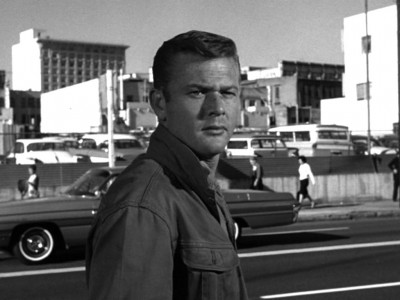
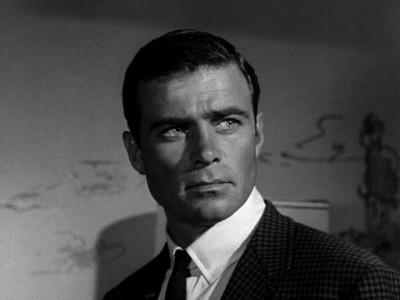
If this behind-the scenes production tumult did effect creator/producer/and head writer Stirling Silliphant, however, it doesn't show, because Silliphant has fashioned some of the series' best outings here - a fact that makes Maharis' departure all the more frustrating because it led to the eventual demise of the show. As usual with Silliphant's work on Route 66, one of his most prominent themes is the constant battle an individual wages over barriers (usually self-imposed) that thwart his or her efforts to realize themself at their fullest emotional potential. Love, or more commonly, the lack thereof, is always the two ends of the same circle for Silliphant. Love and understanding are what we strive for, even when we harm ourselves deliberately to push it away, and yet, love is also a commitment to another person that requires some degree of sacrifice to our ultimate individual freedom. With love for another person (and acceptance of ourselves, faults and all), we can't win for losing, but we can come to some kind of understanding and peace with the unresolved nature of life.
Silliphant had an uncanny knack for framing beautifully poetic-sounding passages about life and love and truth and beauty within his quirky, restless narratives (certainly as much a draw for fans of Route 66 as the format itself of two young searchers in a shiny new Chevy Corvette, exploring the vast America), a gift that gives many of Route 66' episodes an aural depth and complexity that was largely missing from most of the early 1960s' network television schedules. But he wasn't above examining his own creation - these two existential American wanderers who sought something other than a Cold War 9-5 existence - in both serious and humorous ways, looking for flaws and contradictions that would keep the characters and dramas fresh and interesting. In this season's opening episode, One Tiger to a Hill, the first date between Tod and lovely Toika (Laura Devon) skirts dangerously close to Silliphant self-parody, as she rejects Tod's glibness in favor of wanting to keep her heart - a heart reserved for saving wounded people - unbroken: another one of Silliphant's tortured doves who long for freedom from possessive or disingenuous men. And when Tod, sailing out with Buz, rhapsodizes about the unknowable depths of existence that are mirrored in the endless cycle of salmon spawning and dying, the viewer almost sees a literal "Author's Message" card like the one that pops up in What's New, Pussycat?. But Silliphant, almost flippantly, has Buz immediately respond to Tod's description of the salmon's life with, "Monotonous, huh?" to which Tod laughs. Heavy-handed symbolism is acknowledged and punctured. The message is still there if you want it. It's valid. But you can laugh at the solemnity of it as delivered by a too-rapt Tod, as well. In Across Walnuts and Wine, Tod and Buz find themselves rooming at a home brimming with dysfunctional cross-currents, which prompts them to playfully bet on whether there are "more tears than laughs" in the home. Their humorous acknowledgment of their predicament is predicated on their adventures always bringing forth a wealth of emotionally wounded people, and their amused resignation to that fact seems specifically wrought by an aware Silliphant.
But those flashes of humor never cheapen or negate Silliphant's messages, nor his search to more fully explore Tod and Buz, even if it means we may not like their actions from time to time. Indeed, in Across Walnuts and Wine, Buz lays down one of Silliphant's signature raps about the sterility and conformity of bourgeois America when he evaluates his new surroundings: "Just an ordinary family. House on the hill, flowers out front, swings for the kids, but you can smell it. Burnt toast. You can see the smoke under the door. Day in, day out: domestic tragedy popping out of the toaster. A piece at a time; a gulp at a time...until you're dead. But nobody can tell looking at you, just how dead you are," a sentiment that raises Tod's ire at the hypocrisies of Buz's blanket judgment of people, and his refusal to get involved with them. Buz's penchant for angry, even vengeful judgment calls comes into play in Silliphant's Ever Ride the Waves in Oklahoma?, when he attacks, both verbally and physically, a drop-out surfer who shows little remorse for a kid from the sticks who killed himself trying to match his skills on the board. When humiliating Jeremy Slate about working as a busboy (when he's the "king" of the beach) doesn't satisfy him, he takes Slate out and gives him a typical Buz pounding. But the harsh realities of the lesson fall on Buz, not Slate, who, bloodied but not at all broken, replies, "So you're up there. But what is that? You're just another wave I'm going to let pass. Something the wind blew in. Something that's going to break apart, and end up in foam. You're all done pounding on me, and what's it done for you? You can't get to me. Nobody can. I was strong enough to walk away from the whole gritty world. But you're locked in. You need the pressure. You've committed yourself way over your head. So go drown." As Buz says later when he admits the mistake of his arrogance about Slate, "I made him feel, but he made me understand." One of the best Route 66 episodes I've seen so far, Ever Ride the Waves in Oklahoma?, beautifully directed by Robert Gist (who gets the camera down low and tracking in some dynamic sequences), gives a small glimpse into the social dynamics that were just around the corner for young America, when even a committed wanderer like Buz looks positively tied-down next to a true drop-out like impassive surfer Jeremy Slate.
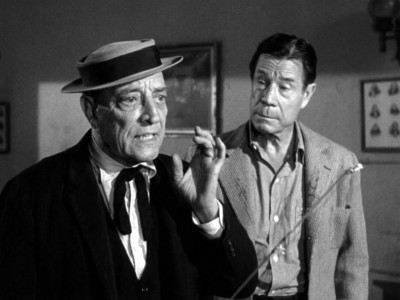
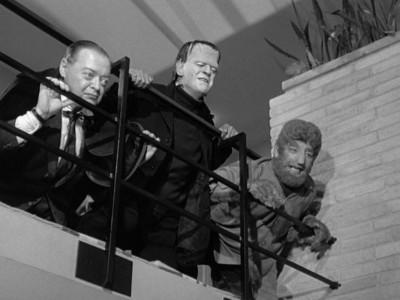
Considering the decidedly serious, even somber tone in the first half of the third season, I was more than pleasantly surprised by two unexpected comedic delights: Journey to Nineveh and Lizard's Leg and Owlet's Wing. Journey to Nineveh, which stars legendaries Buster Keaton and Joe E. Brown (hey - where's a Joe E. Brown boxed set of his delightful early comedies?), may be a bit problematic for some hardcore Route 66 fans who don't want to see Buz falling into a lake to the accompaniment of a slide whistle, or broad slapstick gags in place of dark, soulful, "meaningful" exchanges between tortured individuals. However, if you're tolerant (the way Buz and Tod would want you to be), you'll find Journey to Nineveh quite moving in its own way - even with the baggy pants comedy. Keaton, then enjoying his rediscovery on television (and soon his return to the big screen in several AIP flicks), may look alarmingly older and less graceful than his earlier iconic image, but he's still able to pull off some of his signature moves, while tugging at the heartstrings when describing how he doesn't mind being poor himself; he just doesn't want his loved ones to worry about him. Brown, a favorite of mine when I was kid when his movies like Alibi Ike showed up on the late, late show, is just as facile in getting laughs as he is in getting some sniffles in this delightful farce. Written by William Cox, Journey to Nineveh has the feel of a small silent comedy or a minor Capra film, where the comedy comes from the heart first, and where a small town of eccentrics - complete with a busty blonde innocent, played sweetly and sensuously by Jenny Maxwell - all know each other's business, to humorous effect (I loved seeing Edgar Buchanan doing his usual low-key misdirection shtick).
As for Lizard's Leg and Owlet's Wing, any self-respecting classic horror aficionado would have to consider this Route 66 episode a must-see, if only for the seismic occurrence of Boris Karloff donning his classic Frankenstein make-up once again (was this the only time Karloff did this, later in his career?). Not to be outdone, Lon Chaney shows up, in both classic Mummy and Wolfman make-up, while Peter Lorre gets the biggest laughs making women faint dead away without the benefit of any makeup. The jokes don't have to be very good here for the episode to succeed strictly on the novelty of these three horror icons showing up, but luckily, the episode is quite funny in its own right, with Silliphant getting off a very funny parody on executive secretaries and their bosses (at a convention of them, the leader of the group implores the women to give their all to their male bosses - but not their hearts, wherein a boss promptly comes in and carries one off to be married), while saving some good bits for Lorre (he kills when a hotel clerk says the incognito Lorre resembles the real Lorre, to which he replies, "That's pretty insulting, isn't it?"). And clearly, Milner and Maharis seem in genuine awe of these giants; their joy in working with these wonderfully skilled pros jumps right off the screen (Robert Gist again directs, quite sprightly).
Other episodes in the first half of the season vary in overall quality. Only By Cunning Glimpses finds Silliphant exploring themes of predestination and prophecy that no doubt interested the philosophically-minded writer (Lois Smith contributes an appropriately creepy performance as a mentalist). Luther Adler turns in strong work as a Chicago gangster who thinks someone is out to kill him...until he realizes he's not important enough to even be remembered in Man Out of Time. And some interesting and tricky personal and gender politics are explored in Poor Little Kangaroo Rat, where scripter Les Pine doesn't go the easy route by blaming a busy research scientist (Leslie Nielsen) only for the disintegration of his marriage. Other episodes are less successful, such as Every Father's Daughter (the dying woman taking solace in Buz's kindness has already been done), or Welcome to the Wedding (we never believe the basic set-up that Tod would volunteer to aid sociopath Rod Steiger), or Voice at the End of the Line, which has an icky resolution that says all the humiliation suffered by the characters is okay in the end because both of the people involved are unattractive; at the most they should be happy to get each other. Of obvious interest in this set are the four episodes featuring Martin Milner without co-starrer George Maharis (during Maharis' second extended walk-out). Two are quite good, and the other two fair. Where Is Chick Lorimer, Where Has She Gone? has a nice assist by Vera Miles (way better than her reputation)) as a past-it singer on the run from her past (although the story never jells past the familiar), while Silliphant's Give the Old Cat a Tender Mouse brings back Julie Newmar's free-spirit character from the previous season's How Much a Pound is Albatross...but to little effect, pushing her into a familiar story of mismatched. Tod never even meets her, having his own subplot of trying to track her down and getting into a series of supposedly comic arrests by a traffic cop. A Bunch of Pagliaccis is much better, with Silliphant commenting on the increasingly base practices of the media ("Don't knock it. It's the vogue: instant vulgarity."), while penning a fascinating murder mystery that almost holds up until its messy denouement (Laura Devon shows up again, and she's marvelous). Finally, You Can't Pick Cotton in Tahiti sports a marvelously catch-as-catch-can performance by Richard Basehart as a fickle music composer who uses a pretty young Southerner (the wonderful Jean Engstrom) as a crutch to finish an epic composition. With just the right mix of humor and genuine sadness to carry the story over the seamier aspects of the character, You Can't Pick Cotton in Tahiti is the kind of story Route 66 did as well as any other show on TV...and that's the problem with it and the three other George Maharis-less episodes, because the Tod character is merely an afterthought here. These could be entries in any dramatic anthology series; they don't relate strongly to the Route 66 format, as evidence by Tod's peripheral participation. Were these episodes "scrambles" that had to be significantly altered when Maharis refused to show up for work? Or were they cobbled together at the last minute in response to no-show Maharis? In a way, it doesn't matter, because it's enough to say they don't work within the show's structure, because Route 66's structure is broken without Buz. Without Tod and Buz, and without the actual physical comings-and-goings of that pair as they traverse the backroads of America, Route 66 is just another dramatic anthology: distinguished at times, to be sure - but not unique.
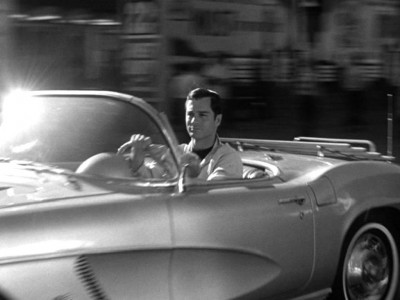
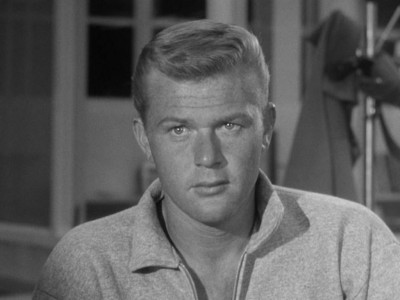


And like it or not, the public seemed set on having Maharis as Milner's partner. After the A Gift for a Warrior episode, Buz is gone for good and absolutely no explanation is attempted for his disappearance. Tod doesn't mention Buz to anyone; no phone calls to hospitals are made. Nothing. It's as if he didn't exist - a denial by the producers and writers that probably didn't sit well with loyal viewers. Curiously, in the next episode, Suppose I Said I Was the Queen of Spain?, Tod appears to have a new traveling buddy: Lee Winters, played by none other than Robert Duvall. With zero explanation or background, Lee appears to have been traveling with Tod for some time; they're quite friendly with each other, and they banter like old pals. Shockingly, Lee even seems to have 'Vette privileges. Was this a try-out for Duvall as a potential co-star of the series? Or an experiment in possibly having Tod cruise around with different co-pilots during his journeys? It's hard to say. But Duvall is only around for that episode before he, too, disappears without any explanation. A few Tod-only episodes follow, and then Linc is introduced. I suppose it's inevitable that comparisons will be made between the Linc and Buz characters, with many loyal Route 66 viewers siding with Maharis not only because he began the series with Milner (and that opening alchemy of original players in a series has a powerful hold that doesn't easily allow for substitutes in the minds of TV viewers), but because of Maharis' charismatic performance. Maharis did have that certain "something" that jumped off the small screen, giving Buz an edge, a danger, that contrasted nicely with Maharis' equally adept expressions of tenderness and existential angst. He played a jumped-up, hep cat out of Brooklyn who would not have been out of place in the various pieces written about the restless Beats who searched for meaning in a supposedly soulless America. And that nervy, jangley kind of energy balanced perfectly against the more wholesome, stolid questioning of Martin Milner's Tod.
As for Corbett...that potentially explosive, nervous energy is missing within this calm, almost too-sedate performer. Corbett is quite good at playing strong and silent, but that only gets you so far with the thematically and motivationally complex writing of frequent scripter, Stirling Silliphant. Corbett's handsome but relatively inexpressive face just doesn't register the level of searching and pain and unease - as well as the hipster flights of poetic fancy and sheer joy of being alive - that Silliphant's writing routinely requires of his wandering heroes. Certainly series creator Silliphant gets kudos for introducing on television what has to be one of the earliest depictions of the coming emotional horrors that would plague tens of thousands of future Vietnam veterans, in the guise of Army Ranger Lincoln Case. In his introductory episode, Fifty Miles From Home, we learn that Lincoln not only served a tour in Vietnam, but that he was held prisoner there and had escaped after killing many of his captors (a traumatizing experience that leads to a pre-Rambo "Vietnam flashback" moment where Linc zaps a bunch of snot-nosed college kids for pushing him around). Later in the episode, he tells of a harrowing experience where he lost the woman he loved to the Viet Cong. That not only Silliphant but the CBS network was willing to put this kind of character on television in 1963, indicting not only "war" in general but specifically Kennedy's Vietnam, had to have been a quite daring political move for a weekly TV anthology to make at that time. And how the Linc character will resolve his identity with the military will have to be seen in the upcoming season (in these episodes, Linc is on extended leave, with his option to re-enlist a source of anxiety for him). But unfortunately, this potentially ripe character comes off as more wooden than mysteriously enigmatic under Corbett's listless thesping, undercutting much of the daring of Silliphant's conception.
That unfortunate factor, however, does not alter the fact that these remaining episodes of season three of Route 66 are just as fine as the first half of shows. In my previous review of that first half of season three, I wondered what effect losing Maharis might have on future episodes, in terms of their writing (not on audience acceptance), and after watching these outings, the answer apparently must be, "None." Save for one or two acceptable but not exceptional episodes (The Cage Around Maria, Peace, Pity, Pardon), they are uniformly excellent, making the third season of Route 66 - at least from a writing standpoint - the best of the series. As usual with Silliphant's work on Route 66, one of his most prominent themes is the constant battle an individual wages over barriers (usually self-imposed) that thwart his or her efforts to achieve at their fullest emotional potential. Love, or more commonly, the lack thereof, is always the two ends of the same circle for Silliphant. Love and understanding are what we strive for, even when we harm ourselves deliberately to push it away, and yet, love is also a commitment to another person that requires some degree of sacrifice to our ultimate individual freedom. With love for another person (and acceptance of ourselves, faults and all), we can't win for losing, but we can come to some kind of understanding and peace with the unresolved nature of life.
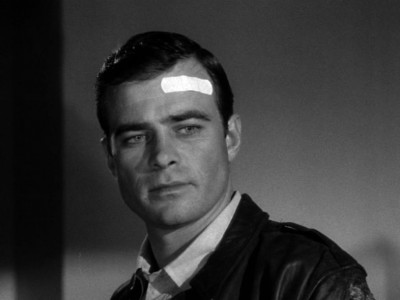
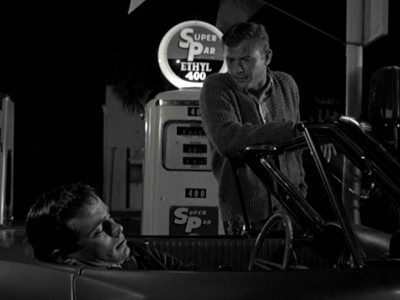
And I can't think of a better example of this achingly bittersweet, temporary meeting of two lives destined to be parted, than Silliphant's The Cruelest Sea of All, which very well may be my favorite episode of the entire series. Tod and Linc find themselves working at Crystal River, Florida's world-famous attraction, Weeki Wachee, where spectators watch a spectacular underwater show where "mermaids" frolic in the crystal-clear springs. Tod works underwater, too, scrubbing clean the viewing windows, when he's not chasing after the various pretty divers who work as mermaids. Imagine his surprise, then, when gorgeous Elissa (Diane Baker) swims in from the springs and begins to poke around curiously at this "strange, new world." At first, Tod thinks Elissa is pulling some kind of gag to get a job, hinting at being "something" other than human to maybe enhance her chances, while pleasantly goofing on Tod and Linc. Later, he suspects she's another in a long line of damaged women he seems to encounter who hide in fantasy to avoid the complications and responsibilities of connecting with another human being. Linc, however, slowly begins to believe she may indeed be a mermaid, a notion confirmed by supervisor Donald McTaggart (Edward Binns), a wise soul who understands that we can hardly explain away a universe that is incomprehensible on every level. Unfortunately, Tod realizes too late that Elissa is truly "of the sea" before she disappears.
I realize that to some readers, that synopsis sounds faintly ridiculous, especially considering the poetic-but-all-too-real shattering of illusions that underpins many Route 66 stories. After all, Silliphant is saying...mermaids are real. Ridiculous, right? Well...not the way Silliphant approaches the question. To Silliphant, Elissa's reality is unquestioned - it's Tod's reaction to her that begs the viewer's increasingly incredulous response: "How can he be so uptight and logical and unbelieving in the face of a gift so lovely and ethereal and precious?" I don't think anyone on television wrote better about lost, beautiful, crazy women than Silliphant, but Elissa is never in doubt about her own self. And Silliphant's delicate-yet-direct scripting for her makes the character seem, without a doubt, real. This isn't something silly like Splash!; Elissa is what she is: a mermaid. And her indescribably sweet, naïve introduction to the human world plays beautifully against the increasingly stiff neck Tod offers in response to her awakening. What Silliphant is getting at here is what Silliphant is always getting at to some degree in many of his love stories: the inability for two individuals to get their perceptions of reality in synch with each other, regardless of how much they may love each other. Silliphant's embrace of an "altered" reality - a world where mermaids do exist - isn't used comically or from a fantasy/sci-fi perspective at all, but as a means for exploring most fully one of his central themes: love does not conquer all when we refuse to accept alternate views of reality - something we may be incapable of doing, anyway. An indescribably sweet, tender love story, simply and unobtrusively directed by James Sheldon, The Cruelest Sea of All also features what I think is the lovely Diane Baker's best performance. It's constructed with utter simplicity and without the faintest touch of parody or spoof or self-consciousness on her part (there's a beautiful scene where gorgeous Baker, swimming underwater, comes up to the glass and kisses it where Milner is, that shows an unrestrained delight on Baker's face - with Milner laughing delightedly, as well).
A more "straightforward" version of this classic Silliphant conundrum comes in Suppose I Said I Was the Queen of Spain?, where Lois Nettleton gives a truly bravura performance as the quintessential Silliphant "ghost woman," an existential, cosmic misfit who floats in and out of peoples' lives, without a past or a future, operating outside the strict conventions of early 1960s America. Tod is brazenly approached one evening by glammed-up Nettleton, who sweeps Tod off his feet...and then promptly absconds with his credit card, running up a $9,000 bill. Sure that he's going to have to sell his beloved 'Vette just to begin paying off this debt, he suddenly comes upon Nettleton working at a Skid Row soup kitchen...only she claims to be someone else entirely. Tod falls in love with this aspect of her fractured identity, too, before she claims to be a third person, telling Tod on a stage at the UCLA Drama Department, that in her world, certainties like "love" and "home" and even one claimed identity, are luxuries she simply can't afford, and that she's destined to be utterly alone, no matter who loves her, nor how deeply she is loved. As I wrote above, Silliphant had an uncanny knack for framing beautifully poetic-sounding passages about life and love and truth and beauty within his quirky, restless narratives, a gift that gives many of Route 66' episodes an aural depth and complexity that was largely missing from most of the early 1960s' network television schedules. And Suppose I Said I Was the Queen of Spain? is a perfect example of his facility to engage in flights of verbal fancy while espousing some truly troubling certainties about the desperate uncertainties of life for those who can't or won't toe society's conventional line.
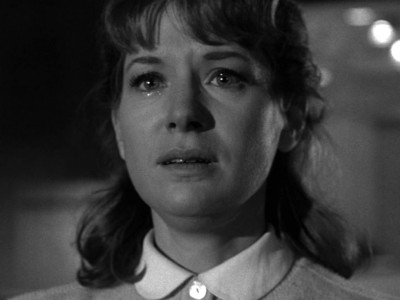
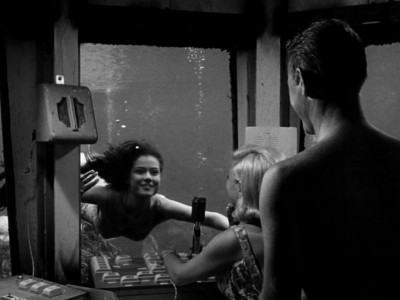
Other standouts in these final episodes of Route 66's third season include the tough, morally compromised actioner directed by Tom Gries, Shall Forfeit His Dog and 10 Schillings to the King, co-starring Steve Cochran, Barbara Shelly, John Anderson, and L.Q. Jones, which shows Tod (through Silliphant's fast-moving script) wondering aloud if he's witnessed murders or sacrifices to misplaced ideals during a posse hunt for a pair of thugs hiding out in the desert hills. In the Closing of a Trunk starts out with a shocking William Castle-like image of Tod being struck unconscious and stuffed into a trunk by a deranged Ruth Roman, but then backs up to be a typically Silliphantian exercise in past recriminations and newly-forged mistakes based on those former indiscretions. What a Shining Young Man Was Our Gallant Lieutenant is a terribly, terribly sad story from Howard Rodman, directed by James Goldstone, featuring Bewitched's Dick York in a moving performance as a former Army buddy of Linc's who, having suffered a catastrophic brain injury, has reverted back to the days when he was only eight years old. Corbett can't summon up the necessary pathos for this potentially devastating story, but York, along with veteran actors Jane Rose and John Litel as his elderly parents, are more than accomplished at getting across the heartbreaking tone of this truly memorable, moving episode. The always sexy, smart Janice Rule has a nice turn in But What Do You Do In March?, a not unfamiliar set-up for Route 66 - a rich woman preys on one of the boys for her own amusement - but which is double the fun here because there are two women looking to break the boys' heart (beautiful Susan Kohner appropriately fits the bill as "Heartbreaker #2" here). Who Will Cheer My Bonnie Bride? may not be a terribly original story - Linc is a reluctant accomplice to some robbers - but superlative performances by Rip Torn and Albert Salmi, and a short, funny spot by Gene Hackman, put this one over. Shadows of an Afternoon would have been a standout if Maharis had starred in it; as it is, we can concentrate on the always-underrated Ralph Meeker's superlative turn as a cynical lawyer, and icon Miriam Hopkins giving another startlingly good late-career turn as a delusional Southern matron.
As for the public's reaction to all the hubbub over season three, Route 66 actually achieved its highest Nielsen rating this go-around, jumping up to a modest 27th for the year, after languishing outside the coveted Top Thirty for its second season (it had reached 30th during its first season). Its lead-in, Rawhide, took a serious tumble this 1962-1963 season, but at 22nd for the year, still provided a decent opening pull for Route 66. Theoretically, Route 66 should have been pulverized by its new direct competition over on NBC: the previous year's sensation, Sing Along with Mitch, which had come in tied for 15th the previous year. But whatever appeal that musical show had in that particular line-up (Hazel helped a lot), dried up considerably this season, with the series dropping out of the Top Thirty altogether opposite Tod and Buz and Linc and that sweet Chevy 'Vette. The fourth and last season of Route 66 would see declining ratings again, as Glenn Corbett's Lincoln Case character failed to interest viewers in sufficient quantities.
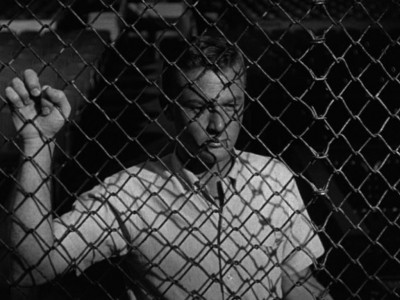
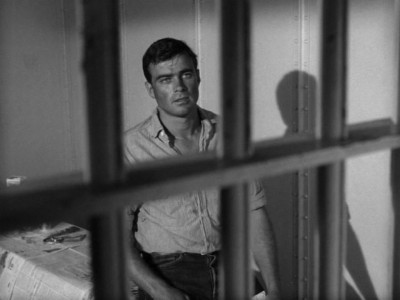
Here are the 31 episodes included in the eight-disc box set Route 66: The Complete Third Season:
DISC ONE
One Tiger to a Hill
Buz and Tod sign on as Oregon salmon fishers, but come afoul of bitter war veteran David Janssen.
Journey to Ninevah
Tod and Buz pick up a hitchhiker - Buster Keaton - who proves to be a jinx not only for his brother, Joe E. Brown, but also for our wandering travelers.
Man Out of Time
Luther Adler portrays a Prohibition gangster, released after 30 years in prison, who believes someone is trying to kill him. Tod idolizes him, but Buz can't understand the attraction.
Ever Ride the Waves in Oklahoma?
Buz takes on the local surfing king, Jeremy Slate, when a casual acquaintance dies trying to match the ho-dad's prowess on the board.
DISC TWO
Voice at the End of the Line
Buz inadvertently helps a group of cruel factory workers play a joke on an unattractive co-worker, so now it's up to the boys to repair his telephone romance.
Lizard's Leg and Owlet's Wing
Boris Karloff, Lon Chaney, and Peter Lorre are in Chicago to discuss their latest TV project, and it's up to hotel worker Tod to keep it secret.
Across Walnuts and Wine
Tod and Buz want to help mixed-up teen Robert Walker, but circumstances in his dysfunctional house - and a visit from his sheltered aunt Nina Foch - make that almost impossible.
Welcome to the Wedding
Convicted murdered Rod Steiger tricks Tod into helping him break out of police custody...but soon discovers there really is no place for him to hide.
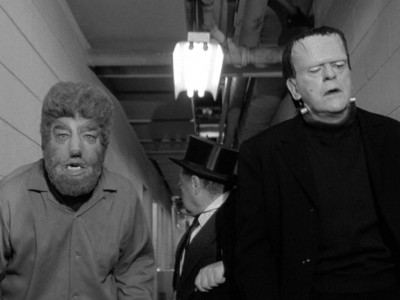
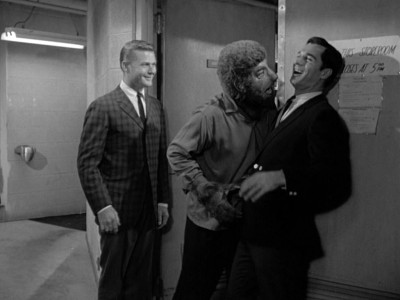
DISC THREE
Every Father's Daughter
Buz is back in construction, and he befriends yet another dying young woman who needs his help.
Poor Little Kangaroo Rat
Tod and Buz sign on with shark researcher Leslie Nielsen, whose work overshadows his commitments to his family, including his little boy, Ronnie Howard.
Hey Moth, Come Eat the Flame
Harry Guardino is an alcoholic piano player down in St. Louis, who's in danger of losing his young son.
Only By Cunning Glimpses
A mentalist predicts that Tod will kill Buz.
DISC FOUR
Where is Chick Lorimer? Where Has She Gone?
Tod becomes involved with a down-on-her-luck, past-her-prime heartbreaker, Vera Miles.
Give the Old Cat a Tender Mouse
Julie Newmar is back, but Tod doesn't meet her, down in Tennessee. But she does contemplate marriage to cotton king Robert Webber.
A Bunch of Lonely Pagliaccis
Tod works as a secretary for a famous writer, who soon becomes embroiled in a media frenzy surrounding his daughter's murder trial.
You Can't Pick Cotton in Tahiti
Hollywood music composer Richard Basehart has found happiness in rural Tennessee, but Tod doesn't like the way he's using the local population - particularly a pretty young girl who idolizes him.
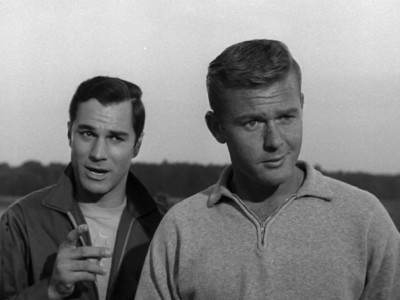
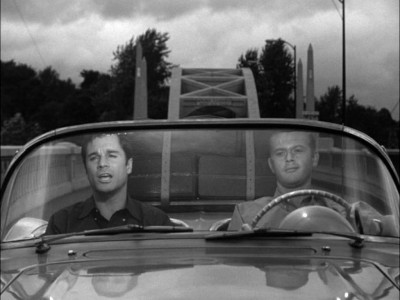
DISC FIVE
A Gift For a Warrior
Tod and Buz befriend a shifty German illegal alien who's bent on revenging his wronged mother. James Whitmore, Lars Passgard and Carolyn Kearney guest.
Suppose I Said I Was the Queen of Spain?
Tod's credit card proves irresistible to a beautiful, strange woman who assumes identities at the drop of a hat. Lois Nettleton, Frederic Downs, Philip Abbott, Robert Duvall, and Harvey Korman guest.
Somehow It Gets to Be Tomorrow
A homeless kid steals Tod's wallet, and soon his heart, and he tries to spirit away his little sister from a loving foster home. Roger Mobley, Martin Balsam, and Leslye Hunter guest.
Shall Forfeit His Dog and 10 Shillings to the King
Tod takes part in a posse to round up some thieves holed up in the desert hills. Steve Cochran, Kathleen Crowley, L.Q. Jones, John Anderson, and Barbara Shelly guest.
DISC SIX
In the Closing of a Trunk
Tod works on a ferry, becoming involved with a murderess recently released from prison...who believes Tod is her son. Ruth Roman, Ed Begley, and Don Dubbins guest.
The Cage Around Maria
Tod, working at the Houston Zoo, rescues a young woman from the bear pit, only to discover greater dangers await her back home. Elizabeth Ashley and Beatrice Straight guest.
Fifty Miles From Home
Tod meets his new traveling partner: former Army Ranger Lincoln Case. Susan Oliver guests.
Narcissus on a Red Fire Engine
Tod's chance encounter with a captivating young girl in a bar leads to an emotionally volcanic situation. Anne Helm and Alan Hale, Jr. guest.
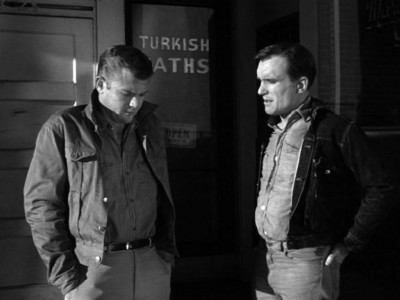
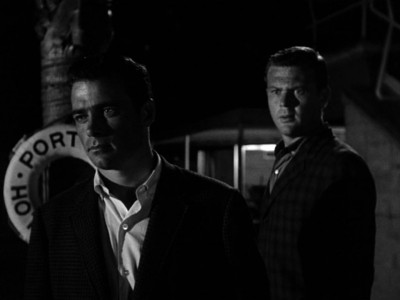
DISC SEVEN
The Cruelest Sea of All
Linc and Tod work at the Weeki Wachee attraction, but Tod gets a bonus in the bargain: he meets a real, live mermaid. Diane Baker and Edward Binns guest.
Peace, Pity, Pardon
Linc and Tod involve themselves with jai-alai players and Cuban rebels down in Florida. Alejandro Rey guests.
What a Shining Young Man Was Our Gallant Lieutenant
Linc discovers his old Army buddy has been horribly injured: he now thinks he's an eight-year-old boy. Dick York and Jane Rose guest.
But What Do You Do In March?
Tod and Linc get jobs as speed boat captains for rival rich girls. Janice Rule and Susan Kohner guest.
DISC EIGHT
Who Will Clear My Bonnie Bride?
Linc is kidnapped by robbers and must decide whether or not to help them escape. Rip Torn, Albert Salmi, and Gene Hackman guest.
Shadows of an Afternoon
Linc makes the papers when he's falsely accused of cutting a little dog on purpose. Ralph Meeker and Miriam Hopkins guest.
Soda Pop and Paper Flags
A wandering bum is singled out as the carrier of a illness that strikes a small town...the town he grew up in. Chester Morris, Alan Alda, Joseph Campanella, and Tom Bosley guest.
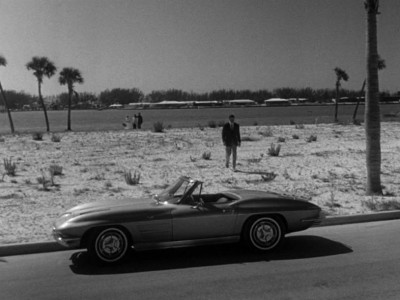
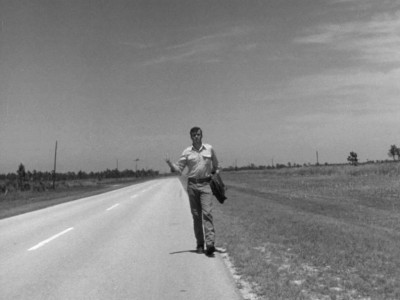
The DVD:
The Video:
I was more than pleased with the full-screen, 1.33:1 transfers for Route 66: The Complete Third Season. The transfers, for the most part, look quite clean and bright, with a frequently smooth, creamy gray scale and minimal grain. Of course, anomalies do pop up, including scratches and dirt, with an episode here or there that look a little faded and blown-out (due to the original source material) but overall, not too bad at all.
The Audio:
I did notice a problem with a number of audio tracks that sounded slightly squelchy or low to me. The English mono audio tracks, for the most part, are reasonably clean, with hiss apparent but not too distracting. But several episodes sounded subpar. Is this a matter of the transfer, or the original materials provided (I suspect the original materials, which no doubt are not the original master tracks)? Still, overall, they're acceptable. Annoyingly, close-captions are listed as available, but they didn't come up on any of my machines or monitors.
The Extras:
Some vintage commercials and bumpers for Route 66 are included as a bonus here. Commercials for Bayer Aspirin, Philip's Milk of Magnesia, Philip's Tablets, and a bumper for Chevrolet Presents Route 66 are included (I believe these are the same ones used for both split seasons).
Final Thoughts:
A superlative collection of episodes from the best season of the series...even without George Maharis. The themes laid out in Route 66: The Complete Third Season just aren't explored in mainstream network TV offerings today, or if they are attempted, they're bowdlerized by either couching them in terms of sensationalism, or they're put forth with the intellectual and emotional facility and glibness of a People or US Magazine article. And unlike the whining and perpetually frazzled men/women-infants who populate our TV screens today, Tod and Buz and Linc, for all their existential doubts and questions, aren't overwhelmed with today's ubiquitous noxious cocktail of either anxious self-loathing or nerve-dead mockery of everything and everyone, masquerading as irony - a mixture of dread and defeatism that has seemingly infected almost all of our fictional American dramas on television today (as well as our politics, apparently). Americans Tod and Buz and Linc are cocky about their wits, their hard labor, their efforts to win over girls, and they're open and understanding about their own and others' weaknesses. In other words: they're real men...you won't find those on network television today. I highly, highly recommend Route 66: The Complete Third Season.
Paul Mavis is an internationally published film and television historian, a member of the Online Film Critics Society, and the author of The Espionage Filmography.


|
| Popular Reviews |
| Sponsored Links |
|
|
| Sponsored Links |
|
|
| Release List | Reviews | Shop | Newsletter | Forum | DVD Giveaways | Blu-Ray | Advertise |
|
Copyright 2024 DVDTalk.com All Rights Reserved. Legal Info, Privacy Policy, Terms of Use,
Manage Preferences,
Your Privacy Choices | |||||||









